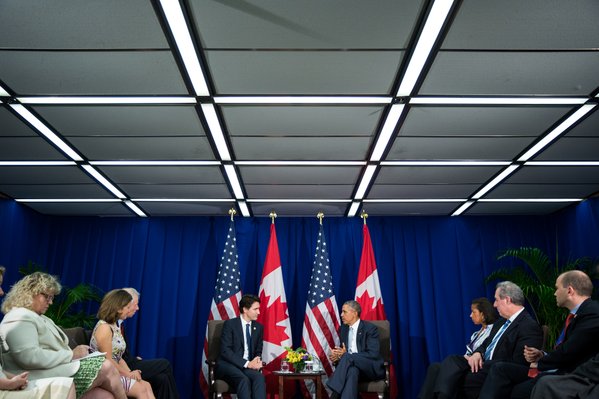Canada News
Changed tone gives Trudeau Liberals benefit of doubt on climate policy

Prime Minister Justin Trudeau tackles climate change with US President Barack Obama.
(Photo from Trudeau’s official Twitter account)
OTTAWA – Canada appears poised to enter the Paris climate conference at the end of the month offering an emissions reduction target crafted by the previous federal government.
But unlike the Harper Conservatives, who were globally panned as climate laggards, Justin Trudeau’s Liberals are being widely lauded, despite the absence of firm new policy measures.
Trudeau meets with Canada’s provincial and territorial leaders Monday in Ottawa before heading to Europe for a week-long trip that culminates with the UN-sponsored COP21 in France. Indications so far suggest the Liberals will keep the same 2030 target for cutting Canadian greenhouse gas emissions by 30 per cent below 2005 levels that were announced by the Conservatives last May.
“I believe that the federal government has already made some statements around not altering targets that exist today,” Darrell Pasloski, the Yukon premier who is assuming chairmanship of the Council of the Federation, told The Canadian Press in an interview.
Pasloski said each province and territory has unique needs and policies on the climate file and that’s what needs to be discussed with Trudeau.
“Certainly, collectively as Canada’s premiers, we’ve been asking or requesting a first ministers’ meeting with the previous prime minister for a long time.
So I think that that’s a very good start to the relationship.”
Monday’s meeting may begin to take shape Friday when two premiers at the vanguard of provincial climate action speak to the Canada 2020 policy conference in Ottawa. Ontario’s Kathleen Wynne and Quebec’s Philippe Couillard will lead a discussion immediately following a keynote speech by new federal Environment Minister Catherine McKenna.
Highlighting individual provincial actions will be a key part of the first ministers meeting, Saskatchewan Premier Brad Wall said in Regina.
Wall said the national emissions target set by the Conservatives last spring is “onerous” for Saskatchewan because of his province’s dependence on coal-fired electricity generation, coupled with its energy and mining resource industries.
“We’re just now actually evaluating the economic impact of even the Harper targets,” said Wall, who is concerned that McKenna has referred to the Conservative goal as a “floor” for ambition.
He said he won’t “pre-judge the federal government” and noted the Liberal platform included provincial autonomy in achieving national goals.
“We’re going to start from the premise of goodwill towards that position and work with them on what they’re thinking about on the targets,” said Wall.
Part of provincial goodwill, for now, may come from Liberal campaign promises totalling billions of dollars in new green infrastructure funding that has yet to be divided up.
But the goodwill extends well beyond the first ministers, and even beyond Canada’s borders, despite the absence of firm commitments.
According to the World Resources Institute, a Washington-based environmental NGO, some 167 countries representing 93 per cent of global emissions have submitted emissions targets to COP21.
Jennifer Morgan, the institute’s climate negotiator, this week cited the actions of the U.S. and China, Brazil, Poland within the European Union, and Canada as determinants – for good or ill – of the Paris conference outcome.
“What’s the new Canada going to do?” Morgan said in a call with international media. “That’s I think an interesting story to watch when Trudeau arrives.”
Vancouver Mayor Gregor Robertson, speaking Thursday at the Canada 2020 conference, lauded the Liberals and contrasted them to the previous government which, he said, went to climate conferences as “a lobbyist for an industrial sector.”
The Liberal approach, said Robertson, is “in the finest tradition of globalism. And it’s about damn time.”
Trudeau has promised another first ministers meeting within 90 days of Paris to hammer out a complete Canadian climate policy, which suggests policy ambiguity could continue for months.
In the meantime, Green party Leader Elizabeth May is counselling patience.
Canada has a constructive role to play, said May, and the outcome of the Paris conference remains very much a matter still to be negotiated from the draft text.
“If the weakest possible treaty comes through, it won’t be worth the paper it’s written on,” May told a news conference.
“If the strongest possible treaty comes through, we’ll be in good shape to substantially decarbonize the global economy by 2050. In this mix, Canada has a huge role to play, which is why I’m impatient with cynicism and dumping on the new government before they have a chance to actually put together a new package.” – With files from Joan Bryden and Jennifer Graham





















